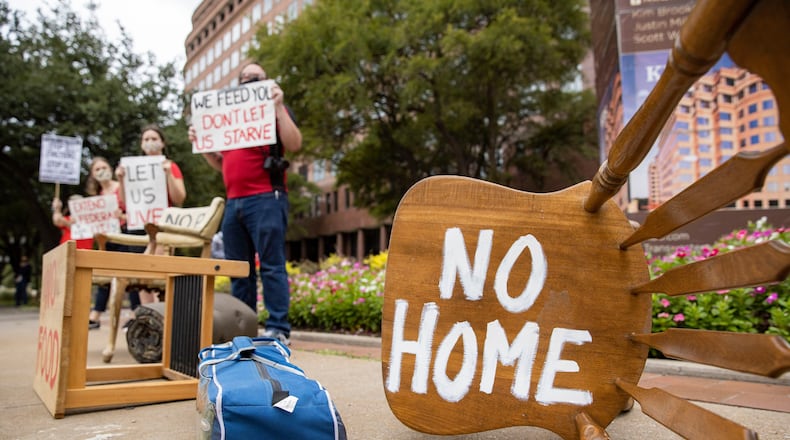A new influx of federal funding could provide a crucial life vest to thousands of renters in Georgia and metro Atlanta.
The state of Georgia and several metro Atlanta governments are offering rental assistance to tenants who are struggling due to the pandemic. The funding comes from the federal stimulus package passed at the end of last year.
The U.S. Treasury’s $25 billion Federal Emergency Rental Assistance Program allocated millions to the state and 12 cities and counties that have over 200,000 people. Those cities and counties, which includes the city of Atlanta and nine metro Atlanta counties, are running their own programs to distribute the funds.
The Atlanta City Council voted Monday to partner with United Way, which administered its first round of funding, to distribute its $15 million allocation this time around. Several other counties already have rental assistance programs up and running; others are expected to launch in the next few weeks.
The logistics of applying for rental assistance depends on jurisdiction. Last week, the state opened up applications for its $552 million program. But for now, people who live in a place that is running its own program are not eligible for rental assistance through the state, according to the Georgia Department of Community Affairs.
That includes core Metro Atlanta counties.
The state expects to eventually open up the funding to renters in every county “if funds are available,” but it has not provided an estimate for when that might be.
Some counties, including Fulton and DeKalb, launched their own programs in recent weeks and have seen heavy demand. DeKalb, which received $21 million to distribute to tenants, said it is no longer accepting applications “due to overwhelming response for rental assistance.”
Fulton County said it would stop accepting applications for its federal rental assistance program at the end of the day Monday due to overwhelming demand.
Susan Reif, the eviction prevention project director at the Georgia Legal Services Program, said the new funds from the state will be critical for renters who have fallen behind on their payments, especially those who live in cities or counties that have not offered their own rent relief programs. She said some people that have come to her organization for help are up to seven months behind on rent.
“It’s a fresh start for these tenants,” Reif said.
A federal moratorium is stopping evictions from taking place if they are based solely on non-payment of rent. The moratorium is currently set to expire at the end of March.
Landlords and utility providers can also apply on behalf of tenants; funds can be used for back rent, current and future rent and utility payments.
Renters must meet the following conditions to qualify:
- Qualified for unemployment benefits or experienced a reduction in household income, incurred significant costs, or experienced other financial hardship due directly or indirectly to the pandemic.
- Demonstrate a risk of experiencing homelessness or housing instability.
- Have a household income at or below 80% of the area median income.
This round of funding for rental assistance was part of the stimulus bill passed by Congress and signed into law by former President Donald Trump in late December. It’s separate from both the first CARES Act package and President Joe Biden’s American Rescue Plan package passed last week.
The following governments were given funding for rental assistance; some of them have launched programs to begin dispersing the funds:
- State of Georgia, $552 million; www.georgiarentalassistance.ga.gov
- City of Atlanta, $15.3 million; www.relief.claytoncountyga.gov/eviction-prevention
- Augusta-Richmond County, $6.1 million
- Chatham County, $8.7 million; www.chathamcountyga.gov/OurCounty/EmergencyRental
- Cherokee County, $7.8 million
- Clayton County, $8.8 million; www.relief.claytoncountyga.gov/eviction-prevention
- Cobb County, $22.8 million; www.cobbcounty.org/communications/news/cobb-covid-assistance-center
- DeKalb County, $21.6 million
- Forsyth County, $7.4 million
- Fulton County, $18 million; www.fultoncountyga.gov/rentalassistance
- Gwinnett County, $28.2 million
- Hall County, $6.2 million
- Henry County, $7.1 million
About the Author
The Latest
Featured



